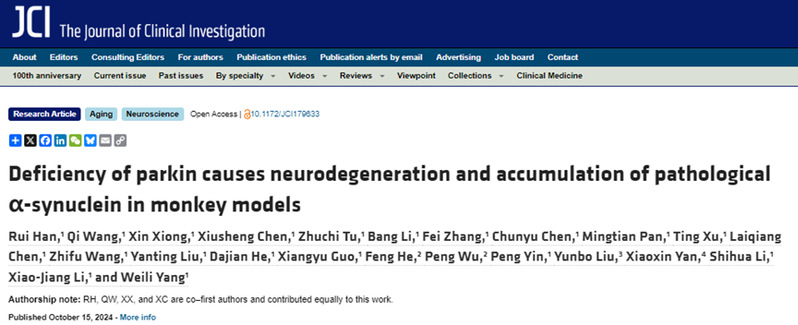- ABOUT JNU
- ADMISSION
-
ACADEMICS
- Schools and Colleges
-
Departments and Programs
- Arts College of
- Chinese Language and Culture College of
- Economics College of
- Electrical and Information Engineering College of
- Foreign Studies College of
- Information Science and Technology College of
- Environment School of
- Humanities School of
- International Business School
- International Studies School of
- Journalism and Communication College of
- Law School
- Liberal Arts College of
- Life Science and Technology College of
- Management School of
- Marxism School of
- Medicine School of
- Pharmacy College of
- Physical Education School of
- Science and Engineering College of
- Shenzhen Tourism College
- Research Institute
- Research Center
- Programs in English
- Majors
- Study Abroad
- Online Learning
- RESEARCH
- CAMPUS LIFE
- JOIN US
New Insights into Parkinson's Disease Pathology from Guangdong-Hong Kong-Macao Central Nervous Regeneration Research Institute
Author: Yang Weili
Publisher: Guangdong Hong Kong Macao Central Nervous Regeneration Research Institute
Date: October 21, 2024
On October 15, the research team led by Yang Weili, Li Shihua, and Li Xiaojiang from the Guangdong-Hong Kong-Macao Central Nervous Regeneration Research Institute at Jinan University published a groundbreaking study titled Deficiency of Parkin causes neurogenesis and accumulation of pathological alpha synuclein in monkey models in the Journal of Clinical Investigation, a top-tier medical research journal with an impact factor of 13.3.

Overview of the Research
Parkinson's Disease (PD) is a neurodegenerative disorder characterized by the age-dependent loss of neurons and the accumulation of toxic phosphorylated α-synuclein (pS129-α-syn). The precise mechanisms behind these pathological changes have been poorly understood. Known mutations in the parkin gene (PARK2), which encodes the parkin protein, have been linked to early-onset PD, but existing parkin-knockout (KO) models, such as those in mice and pigs, fail to replicate the neurodegeneration seen in humans.
Key Findings:
- Establishment of Monkey Models: Utilizing CRISPR/Cas9 technology, the team developed parkin-deficient monkey models across different ages.
- Neurodegeneration Discovery: The study found that parkin deficiency led to neurodegeneration specifically in the substantia nigra region of the monkey brain, demonstrating age-dependent neurodegeneration.
- Role of Parkin Phosphorylation: The research highlighted that the phosphorylation of parkin declines with age, which correlates with its increased insolubility. Phosphorylated parkin plays a critical role in neuroprotection and in mitigating the accumulation of pS129-α-syn.
- Therapeutic Implications: Overexpression of the wild-type (WT) parkin effectively reduced pS129-α-syn accumulation, whereas a mutant form that could not be phosphorylated by PTEN-induced putative kinase 1 (PINK1) did not yield the same protective effect. This underscores the importance of parkin phosphorylation in the pathogenesis of PD and suggests it as a promising target for future therapeutic strategies.
Research Team
Co-first authors of the paper include doctoral students Han Rui, Wang Qi, Xiong Xin, and Chen Xiusheng from Jinan University. The research team is supported by co-corresponding authors: Researcher Yang Weili, Professor Li Shihua, and Professor Li Xiaojiang.
Funding and Acknowledgments
This study was funded by multiple organizations, including the National Natural Science Foundation of China, the Guangdong Provincial Key Field Research and Development Project, the Guangdong Provincial Department of Science and Technology Project, the Guangdong Provincial Basic and Applied Basic Research Fund, and Jinan University.
For more detailed insights, the full paper can be accessed [here]
(https://www.jci.org/articles/view/179633), and additional coverage can be found on the Bioart academic media reporting link [here]
(https://mp.weixin.qq.com/s/vGHHbLTNL_Hbftz3RnfK9A).
NEWS
- About the University
- Quick Links
Copyright © 2016 Jinan University. All Rights Reserved.




